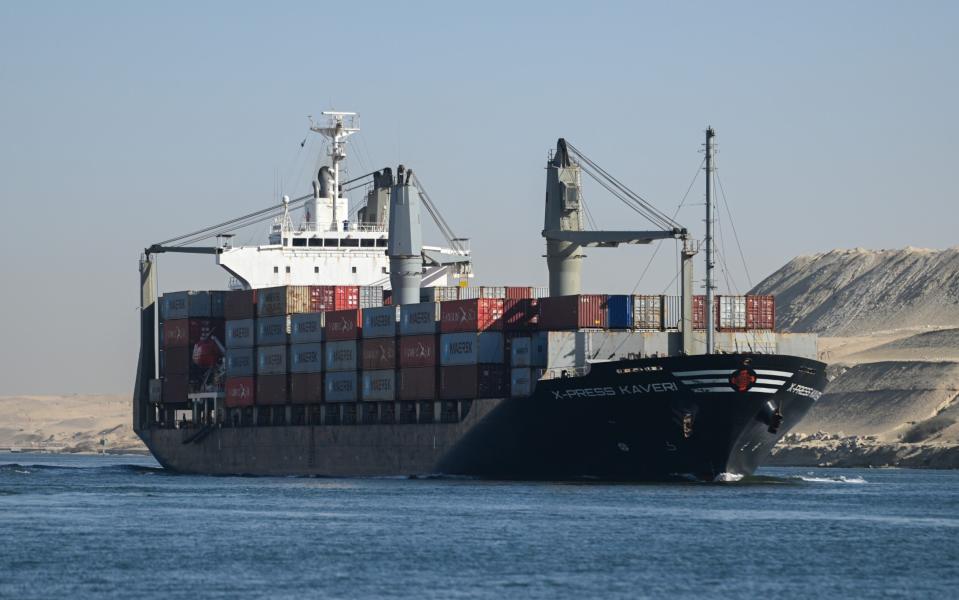Sainsbury’s in ‘regular talks’ with No10 over Red Sea risk to food prices

Sainsbury’s is in contact with Downing Street about disruption in the Red Sea, amid fears that attacks on ships by Houthi rebels will disrupt supplies and push up prices.
Simon Roberts, chief executive of Sainsbury’s, said the supermarket was monitoring the impact of disruption to trade routes caused by Yemen-based rebels.
Iranian-backed Houthi forces have mounted a wave of attacks on vessels in the Red Sea since October in protest at Israeli military action in Gaza.
The rebels launched their largest strike to date on Tuesday night, with 18 drones and three anti-ship missiles shot down by UK and US forces patrolling the waterway.
Mr Roberts said: “It’s an issue for many commercial businesses, and therefore an important issue that the government would want to be involved with.
”We’re on regular calls there to make sure that the latest intel and understanding is understood.”
Attacks in the Red Sea have forced shipping companies to reroute traffic around Africa, adding to the time and cost of deliveries.
Mr Roberts said: “The vast majority of shipping companies are now going around the Cape, which takes 10 to 14 days longer, rather than going through the Suez Canal for obvious reasons.”
Sainsbury’s, which also owns Argos, imports general merchandise and other products such as wine through the Suez Canal, which sits at the northern end of the Red Sea.
Mr Roberts said: “We’re working hard to make sure that we mitigate any impacts for customers, both in terms of availability, but also we have long term contracts in place on these issues, so make sure that we mitigate any cost impacts as far as possible.
“We’ve had a lot of experience on similar matters, going back to the pandemic, and the issue in the Suez Canal by way of the disruption there.”
His comments come as Sainsbury’s reported on its Christmas trading. A boost to food and drink sales was cancelled out by falling sales of electronics and clothing, triggering a 5pc drop in the supermarket’s share price.
Argos was blamed for the weak electronics sales as customers cut back on expensive items such as TVs. Purchases at the retailer fell by 4.2pc in the six weeks to January 6.
Elsewhere, grocery sales at the supermarket giant rose by 8.6pc, supported by record sales of sparkling wine, mince pies and pigs in blankets over Christmas. Sales of Taste the Difference products jumped by 13pc over the festive period.
Sainsbury’s, the UK’s second-largest supermarket, increased its market share from 15.6pc to 15.8pc in December, according to the most recent Kantar data.
The grocer, along with other traditional supermarkets, has been locked in a battle with discounters Aldi and Lidl after the German discounters gained momentum during the cost of living crisis.
Sainsbury’s rolled out a new Nectar Prices offer last year, providing steep discounts for shoppers that signed up to its loyalty scheme.
Mr Roberts claimed on Wednesday that customers saved an average of £16 over Christmas through the scheme.
Last month, he told The Telegraph that traditional supermarkets were seeing a boost as people returned to offices.
He said that people were seeking out shops where they could buy all their groceries in one place, rather than hunting out bargains across multiple stores
Mr Roberts said on Wednesday: “We enter 2024 with strong momentum and next month we will share our updated strategy, building on all we’ve done to put food back at the heart of Sainsbury’s over the last three years.”
His comments come as the Competition & Markets Authority (CMA) is set to begin a probe into how grocers are using loyalty card prices amid concerns that increasing use of these schemes may be making it harder for shoppers to compare supermarkets for the best prices.
Aldi’s UK boss Giles Hurley told The Telegraph this month shoppers wanted “clear, transparent prices so they know how much they’re spending long before they get to the till”.

 Yahoo Finance
Yahoo Finance 